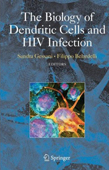Dendritic cells play the most vital part in inducing anti-viral
immune responses in HIV and AIDS among many other viruses. Research
on dendritic cells (DCs) is emerging as a fundamental aspect for the
comprehension of the mechanisms underlying the pathogenesis of viral
diseases as well as for the progress on the development of
prophylactic and therapeutic vaccines.
This volume focuses on the role of DCs in the pathogenesis and
immunity of HIV-1 infection. It has recently been clarified that DCs
are important targets and reservoirs of HIV and may play an important
role in virus spreading to T cells. Interestingly, HIV can exploit
many of the cellular processes responsible for the generation and
regulation of the adaptive immune responses to gain access to its
main target cells, i.e. the CD4+ T lymphocytes. Thus, the central
role of DCs in stimulating T cell activation not only provides a
route for viral transmission, but also represents a vulnerable point
at which HIV-1 can interfere with the initiation of primary T cell
immunity.
Recent studies have revealed that several HIV proteins can profoundly
influence the phenotype and functions of DCs even in the absence of a
productive infection, often resulting in an abnormal immune response.
While this knowledge has resulted in the identification of some major
mechanisms involved in the pathogenesis of HIV-1 infection, the
recent progress on DC biology has opened perspectives in the research
on new adjuvants (selectively acting on DCs) and on novel strategies
for the in vivo targeting of antigens to DCs, which appear to be
highly relevant for the development of HIV vaccines. Of note, defects
in the number and functions of DCs have been observed in the course
of HIV infection and during disease progression, thus suggesting that
DCs play an important role in the immune control of viral replication
and virus-induced dysfunctions. The development of therapeutic
vaccination strategies to be combined with HAART is thought as an
important step for an effective control of HIV infection in patients.
In this context, the use of autologous DCs may represent an
attracting strategy. Notably, DCs are now regarded as a valuable
approach for the development of cancer vaccines and several clinical
trials have explored the efficacy of different DC preparations as
cellular adjuvants in inducing a potentially protective immune
response. Recent data in animal models provide the background for the
clinical testing of DC-based vaccines in HIV-1-infected patients. Now
that we start to understand the complex interactions between HIV and
DCs in the pathogenesis of AIDS and we are learning how to prepare
potentially effective DCs from lessons on cancer vaccines, we may
reasonably assume that DC-based therapeutic vaccines can represent a
topic of increasing interest in protocols of clinical immunotherapy
of HIV-1-infected patients.
차 례
Introduction.- DC Biology, Plasticity, and Subsets.- DCs and the
Immune Response to Viral Infections.- HIV Receptors on DC Subsets.-
DCs as Targets, Reservoirs, and Effectors in HIV Infection and
Spreading.- Mechanisms of HIV Exploitation of DC Biology for
Subverting the Host Immune Response.- Changes in DC
Phenotype/Function During HIV Infection and Disease; Effects of HAART
on DCs.- DCs and their Emerging Importance as Cellular Adjuvants for
the Development of Therapeutic Vaccines.- Future Challenges on How to
Exploit the Recent Progress on DC Biology for the Development of HIV
Vaccines (new adjuvants, antigen targeting on DCs, DC-based
vaccines).- Final Remarks.- Index.


